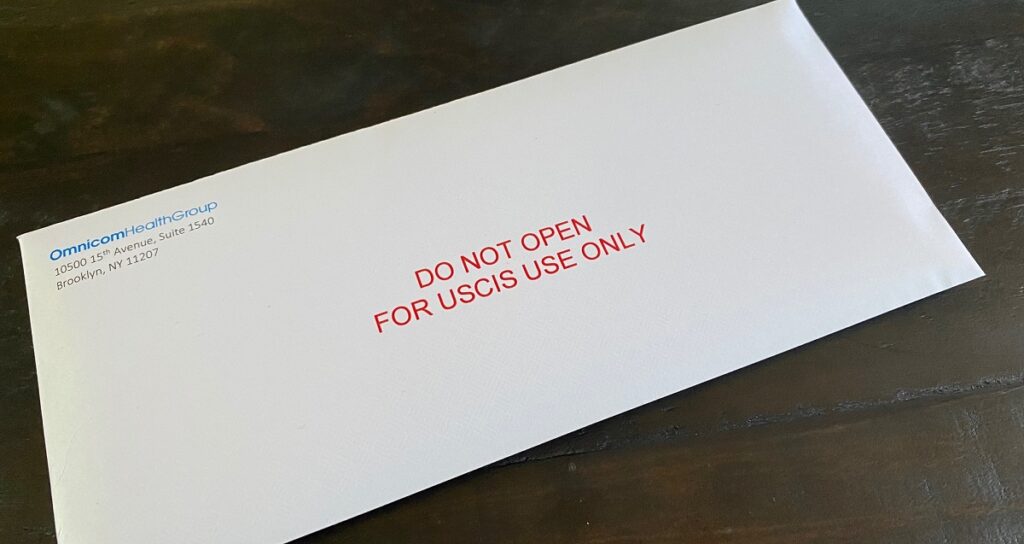
An immigration medical exam is a necessary part of immigrating to the United States and becoming a permanent resident (green card holder). Sometimes called a green card medical exam, the appointment is a routine part of the process to ensure public safety and remove the grounds for inadmissibility for intending immigrants.
Certain diseases of public health significance make an individual inadmissible to the United States. That means it could prevent the applicant from getting a green card. The exam is the process to remove these grounds of inadmissibility. CitizenPath can help you prepare the entire adjustment of status application, but you’ll need to attend the exam on your own. Therefore, it’s important to know what to expect and how to prepare for your medical examination.
Purpose of an Immigration Medical Exam
The medical grounds of inadmissibility, the medical examination of foreign nationals, and the vaccinations administered to foreign nationals are designed to protect the health of the United States population. The immigration medical examination, the resulting medical examination report, and the vaccination record provide the information U.S. Citizenship and Immigration Services (USCIS) uses to determine if a foreign national meets the health-related standards for admissibility.
Any of these four basic medical conditions may make an applicant inadmissible on health-related grounds:
- Communicable disease of public health significance
- An immigrant’s failure to show proof of required vaccinations
- Physical or mental disorder with associated harmful behavior
- Drug abuse or addiction
The immigration medical examination is not a complete physical examination. Its purpose is to screen for certain medical conditions relevant to U.S. immigration law. The U.S. government doesn’t require the doctor to evaluate you for any conditions except those the U.S. Public Health Service specifies for U.S. immigration purposes. Likewise, the government doesn’t require the doctor to provide you with diagnosis or treatment even if he or she discovers other issues related to your health. This examination is not a substitute for a full physical examination, consultation, diagnosis, or treatment by your primary health care provider.
Selecting a Doctor for your Exam
You won’t be able to go to any doctor for your immigration medical exam. The examination must be performed by a government-approved doctor. Outside the United States, the U.S. embassy or consulate will refer to authorized as “panel physicians.” Applicants applying inside the United States will go to a “civil surgeon.” They both situations, they are doctors authorized to provide your exam.
If you are applying for an immigrant visa through a U.S. embassy or consulate (known as consular processing), they will provide a list of panel physicians who have been certified the Department of State. In most cases, you’ll have a choice of physicians. But it’s always best to check with the procedure at your local consulate. You may need to have your appointment notification before the panel physician will see you.
For adjustment of status cases, you must attend an examination with a civil surgeon in the United States. A directory of civil surgeons is also available.
When to Schedule an Immigrant Medical Exam
For consular applicants, the National Visa Center will tell you when it’s time to schedule the appointment. You will need to complete the medical exam and vaccinations before your scheduled immigrant visa interview date.
Adjustment of status applicants may have more flexibility. CitizenPath prefers that our customers submit the exam results with the adjustment of status application package as part of a concurrent filing. In this way, the entire package of items is available to USCIS to quickly process. If you choose to follow this path, make an appointment with the civil surgeon before you begin the green card application process on CitizenPath. Submit the results with your Form I-485, Application to Adjust Status.
Some adjustment applicants feel rushed to submit the application or prefer to do the immigration medical exam at a later time. If this is your path, schedule your exam soon after filing the I-485 application. Take the results with you to the green card interview.
When applying inside the U.S., the exam results must be signed by the doctor no more than 60 days before you submit Form I-485. The results are valid for two years from the signature date.
What to Take to your Medical Exam
In preparation for the medical examination, you will need to take several items. This list will vary based on the location of your exam. If you are attending an exam outside the United States, the U.S. embassy will give you specific guidance for your country. However, you will generally need to take the following items to an immigration medical exam:
- Valid passport or other government-issued photo identification
- Vaccination records
- Form I-693, Report of Medical Examination and Vaccination Record (if adjusting status)
- The required fee (varies by doctor)
- Required number of U.S. passport photos (if applying abroad – check with consular office)
- Report of the condition and any special education or supervision requirements (if anyone in your family is immigrating with learning disabilities)
- List of medications (if you are being treated for a chronic medical condition or taking medications on a regular basis)
- Tuberculosis certificate from your doctor (if you’ve had a previous positive skin test for tuberculosis) proving that you were adequately treated
- Certificate of clearance signed by a doctor or public health official, proving that you were adequately treated (if you have had syphilis)
- If you have a history of harmful or violent behavior resulting in injury to people or animals, information that will allow the doctor to determine whether the behavior was related to a psychiatric or medical problem, or to drug or alcohol use
- If you have been treated or hospitalized for psychiatric or mental illness, or alcohol or drug abuse, written certification including the diagnosis, length of treatment, and your prognosis
Vaccinations
The doctor will make sure that you have had all the required vaccinations. Some vaccines are expressly required by the Immigration and Nationality Act, and others are required because the Centers for Disease Control and Prevention (CDC) have determined they are in the interest of public health. Regardless, you must receive the following vaccinations before being admitted as a permanent resident:
- Mumps, measles, rubella
- Polio
- Tetanus and diphtheria toxoids
- Pertussis
- Haemophilius influenza type B
- Hepatitis B
- Varicella
- Influenza
- Pneumococcal pneumonia
- Rotavirus
- Hepatitis A
- Meningococcal
- COVID-19 (See details below)
At the time of publishing this article, the list above is complete. However, new vaccinations may be added to the list over time. Not everyone requires all the vaccinations. USCIS maintains a chart of vaccinations that are considered medically appropriate by age.

If you already have some or all vaccinations, take your vaccination reports to the doctor. The report will need a certified translation if it is not already in English. If you haven’t been vaccinated, the doctor will administer them. Depending on the type of vaccination, an additional visit may be required. Upon the recommendation of the physician, he or she may provide certain waivers of the vaccination requirement.
COVID-19 Vaccination
Effective October 1, 2021, most new green card applicants must be fully vaccinated. If not vaccinated, the U.S. government will consider them inadmissible to the United States. This applies to:
- Adjustment of status applicants inside the U.S.
- Consular processing applicants outside the U.S.
Immigration officials may require people to get revaccinated with an FDA-authorized vaccine if they initially received a COVID-19 vaccine not currently authorized in the U.S.
How to Prove Vaccination Status
At the immigration medical exam, green card applicants must show the doctor evidence that they are fully vaccinated against COVID-19. Acceptable forms of proof include:
- Official vaccination record
- Copy of medical chart
The record should include the dates the applicant received the vaccine, and if available, the name or manufacturer and lot number.
Waiver Availability
Certain applicants may be entitled to a waiver for the COVID-19 vaccination requirement. Waivers may be provided for:
- Age
- Contraindication (negative reaction to vaccine)
- Vaccine not routinely available
- Religious or moral convictions
RECOMMENDED: COVID-19 Vaccine Waiver for Immigrants
Medical History
The doctor or a member of the doctor’s staff will ask questions about your medical history. Of particular interest to the doctor is any time you have ever:
- Stayed at a hospital or experienced significant events in your health history;
- Been put in an institution for a a chronic physical or mental condition; or
- Been sick or disabled so seriously that it resulted in a “substantial departure from a normal state of well-being or level of functioning.”
The doctor will also ask specific questions about habitual drug use. Applicants who are found to be drug abusers or addicts are inadmissible. Recovering drug addicts who are in remission, however, are admissible. Likewise, if the applicant is classified as a drug abuser or addict, the applicant can apply again for permanent residence if his or her drug abuse or addiction is in remission. If you have an history of drug abuse, even if it’s not in your medical records, consult with an immigration attorney before attending the green card medical exam.
Physical Examination
The doctor will then give you a physical examination. Typically, the physical exam includes looking at your eyes, ears, nose and throat, extremities, heart, lungs, abdomen, lymph nodes, skin, and external genitalia. The doctor will also order a chest X-ray and blood test to check for syphilis. Children will generally be excused from the X-ray and blood test requirement. If you are pregnant, contact your respective embassy or consular office to inquire about a postponement.
Mental Examination
The doctor will even perform a mental status exam that assesses your intelligence, thought, comprehension, judgment, affect, mood, and behavior. Applicants who have physical or mental disorders and harmful behavior associated with those disorders are inadmissible. The inadmissibility ground is divided into two subcategories:
- Current physical or mental disorders, with associated harmful behavior.
- Past physical or mental disorders, with associated harmful behavior that is likely to recur or lead to other harmful behavior.
Cost of Immigration Medical Exam
Costs for immigration medical exams can vary significant based on the country where it will be performed and the specific doctor. Prices can vary from $100 to over $400. The U.S. government doesn’t set a standard fee. The cost will depend on the doctor you visit. Therefore, check with a few doctors to find out how much each one charges for the immigration medical exam.
You may also need to consider the indirect costs of the exam. In some cases, you may need to travel to the interview city early for the purposes of the medical exam.
Upon Completion
What happens after completing the examination depends on your location.
In some countries, the panel physician will send the results directly to the U.S. embassy. In other countries, the doctor will give the applicant his/her medical exam results in a sealed envelope and an x-ray which the applicant must take to the interview.

If your immigration medical exam is inside the United States, the civil surgeon will give you a completed Form I-693, Report of Medical Examination and Vaccination Record, in a sealed envelope. Do not open the envelope under any circumstance. Submit the medical exam along with Form I-485, Application to Adjust Status. If you have already filed your adjustment of status application, submit the envelope at the USCIS green card interview. The results of your immigration medical exam are generally valid for two years. Specifically, the Form I-693 is valid only when a civil surgeon signs it no more than 60 days before the date an applicant files the application for the underlying immigration benefit; and USCIS adjudicates the application within two years from the date of the civil surgeon’s signature.
About CitizenPath
CitizenPath provides simple, affordable, step-by-step guidance through USCIS immigration applications. Individuals, attorneys and non-profits use the service on desktop or mobile device to prepare immigration forms accurately, avoiding costly delays. CitizenPath allows users to try the service for free and provides a 100% money-back guarantee that USCIS will approve the application or petition. We provide support for the Adjustment of Status Application (Form I-485), Immigrant Visa Petition (Form I-130), and several other USCIS forms.
Want more immigration tips and how-to information for your family?
Sign up for CitizenPath’s FREE immigration newsletter and
SAVE 10%
on our immigration services



